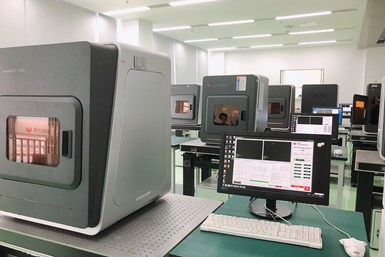BMF Initiative to Develop, Incubate New Products Enabled by Microstereolithography
New BMF research and development center in San Diego, California, was created to develop and incubate end-product ideas that are uniquely enabled by BMF’s microprecision 3D printing platform.
Boston Micro Fabrication (BMF) has opened a new research and development center in San Diego, California. The BMF Research Institute is being formed specifically to develop and incubate end-product ideas that are uniquely enabled by BMF’s microprecision 3D printing platform.
Since shipping the first systems in 2018, more than 300 of BMF’s micro-3D printing systems have been adopted by customers worldwide. These systems are being used for prototyping, development, research and production qualification. Industry segments that have most embraced this platform are in fields such as electronics, optics/photonics, medical devices, microfluidics and life sciences.
BMF says it projection microstereolithography (PµSL) platform was developed to fulfill a high-value need in the additive manufacturing (AM) market that was not being sufficiently addressed by incumbent technologies. These are parts that are typically on the centimeter scale, with tolerance requirements often in the lower tens of micron range. Dozens of industrial customers, having tested and utilized these systems for development, now see the potential for end-part production. BMF continues to work to satisfy the needs of these customers, improve on the platform and ensure requirements of production are met.
Now BMG is beginning a new phase. “After being in the market for a few years, we now see that there are multiple end products that are uniquely enabled by our platform,” says John Kawola, Boston Micro Fabrication CEO. “We are currently working with researchers, product designers and other collaboration partners on new product ideas. We recently raised additional capital to continue the development of our platform. But these funds will also be used for end-product development and commercialization. We expect these two legs will be complementary to each other with the broader goal of unleashing the power of additive manufacturing in micromanufacturing.”
The efforts will be led by Dr. Chunguang Xia, BMF CTO and co-founder. The center will engage in research and engineering with cooperation from other BMF engineering groups and research centers in Shenzhen, Chongqing, Tokyo and Boston.
Related Content
-
What We Found at Formnext 2023
New metal processes, new possibilities for existing processes, the next step for copper and more. Here is a summary drawing on all our reporting from November’s event.
-
Cranial Implant 3D Printed From Hydroxyapatite Ceramic: The Cool Parts Show #76
Cranial implants are typically made from titanium or PEEK; in this episode of The Cool Parts Show, we look at how implants made from a bioceramic can improve osseointegration and healing.
-
Italian Furniture Maker Uses WASP Technology to Create 3D Printed Pendant Lamps
The versatility of 3D printed ceramic enabled the designers to shape a weave reminiscent of the beehive concept, enhanced by the light source.












